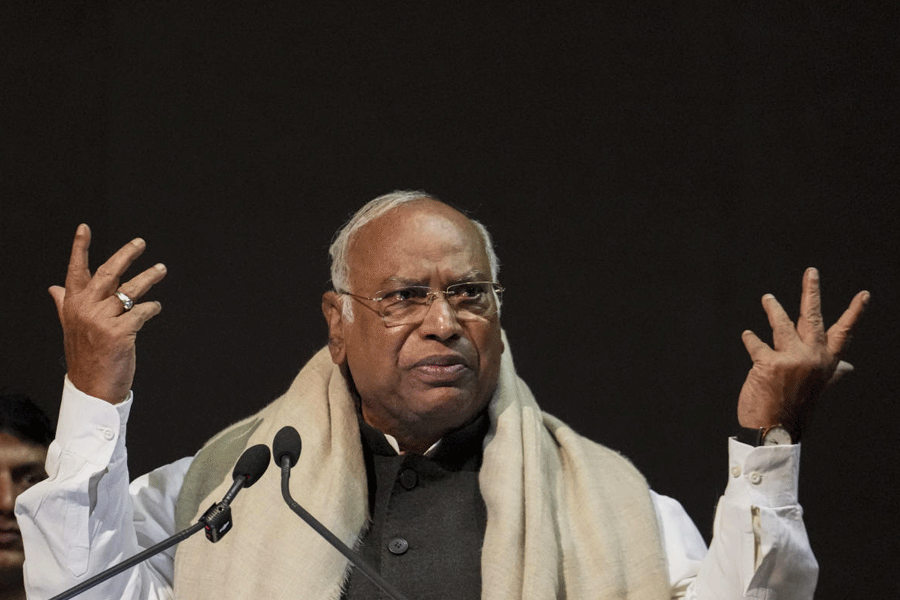Shillong, April 4: The Khasi Students' Union (KSU) today released a documentary highlighting the domination of trade by outsiders in the Khasi-Jaintia region of Meghalaya, as the pressure group commemorated the day when freedom fighter U Tirot Sing had fought the British in 1829.
The KSU and other pressure groups commemorated April 4 as "Khasi National Awakening Day."?
The documentary film was released by KSU president Daniel Khyriem at the gathering in front of the memorial statue of U Tirot Sing at Madan Iewrynghep, Laitumkhrah here in the presence of Northeast Students' Organisation (Neso) chairman Samuel B. Jyrwa, KSU general secretary Auguster Jyrwa and other leaders and members of the union.
Speaking on the occasion, Khyriem highlighted the problem of unemployment faced by the youth of today and pointed out the "wrong policies" of the powers that be, which did not facilitate# employment opportunities. Khyriem also emphasised the failure of the authorities to check benami transactions (people who do business in some other person's name) in the state.
According to the KSU leader, benami transactions are going on in various commercial areas of the state, as the government did not act against the local people who allowed people from outside to run business in their name, leading to domination by outsiders, as far as trade is concerned.
He said that the documentary highlighted the findings of a survey conducted by KSU at various commercial places of Khasi-Jaintia hills, especially in district headquarters, including Shillong, where traders from outside the state dominated various trading activities.
"We are slaves in our own place as long as the economic and political rights are controlled and dominated by others," Khyriem said.
Stating that the local people were competent to run different businesses, Khyriem, however, said many a time the local people, especially the youth, get discouraged as they have to pass through various hurdles for availing of the opportunities offered by the government as well as the problems they face for availing loan from financial institutions.
"The government should come up with a policy that will encourage the local people do business and implement the provisions of the Benami Transaction (Prohibition) Act strictly," the KSU leader demanded.
Asking the government to stop rampant enrolment of people from outside in the electoral roll, the KSU president also called upon the autonomous district councils and the traditional heads to stop issuing no objection certificate to people from outside to set up trading activities as the local people are capable of engaging in any trade.
The Hynniewtrep Youths' Council also commemorated Khasi National Awakening Day.
U Tirot Sing, the Khasi chief of Nongkhlaw kingdom ( hima), had waged a battle against the British who were attempting to take control over the Khasi Hills.
After occupying the Brahmaputra valley, following the signing of the Treaty of Yandaboo in 1765, the British gained control over the Surma valley in 1826. To connect these two valleys, the British wanted to construct a road via Khasi hills, then under Nongkhlaw kingdom.
U Tirot Sing permitted the British to get accesses through the Khasi hills and allowed them to build the proposed road. In return, U Tirot Sing was supposed to gain control of the passes into Assam and the rights to free trade along the proposed new road.
Later, the British positioned a garrison at Nongkhlaw as well as reinforced its forces in Guwahati and Sylhet. When the news came that the British were reinforcing its forces, an indication that they wanted to invade Khasi hills, U Tirot Sing convened a dorbar (assembly) and passed orders for the British to stop the construction and leave Nongkhlaw.
As the British paid no heed, U Tirot Sing and his small Khasi army attacked the British garrison at Nongkhlaw on 4 April 1829.
Thus started the four-year-long Anglo-Khasi war noted for the guerrilla war tactics used by the Khasi army. U Tirot Sing and his army fought with only the native weapons such as swords, bows and arrows.
After U Tirot Sing was defeated and captured by the British in January 1833 from a cave he was hiding in at Nongkhlaw, he was deported to British India's Dhaka (now the capital of Bangladesh), where he died in captivity on July 17, 1835.
The death anniversary of U Tirot Sing is commemorated annually and is declared a state holiday in Meghalaya.











